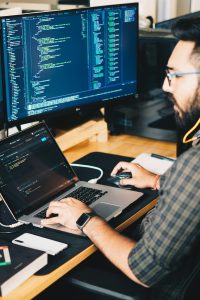AI and Copyright Infringement – A Case History
Following a contentious dispute, Universal Music Group (‘Universal’) has agreed a licencing deal with TikTok, allowing songs belonging by its artists to return to the video-sharing platform.
In February 2024, Universal withdrew music created by its artists (such as Olivia Rodrigo, Drake, Adele) from TikTok following disagreements over compensation and the use of artificial (‘AI’) generated music.
Universal believe that AI, in particular generative AI, does not obtain consent to use its human-created content and therefore breaches copyright law.
Why is Generative AI a concern?
Generative AI is a big concern to those who produce content. This is because complex AI algorithms ‘learn’ from data already in existence, usually data created by humans. AI then uses the data it trains on to formulate its own words, pictures, songs etc. As such, artists believe they are not fairly renumerated for the work they originally created, which AI models can ‘learn’ from, and by which those using AI can monetarily benefit from.
A stark example occurred last year when generative AI trained on songs written by singers Drake and The Weeknd, and subsequently created a new song claiming to be written by these artists.
It is not just music where this concern exists; lots of industries are affected. Getty Images are currently battling AI firm Stability AI in the High Court over similar issues, including AI learning from its data and reproducing copyrighted works. Last year, Louis Dreyfus, the CEO of newspaper Le Monde, called generative AI an ‘emergency’ for the publishing industry.
What data do AI creators model their intelligence on?
AI firms are generally quiet on what exact data and models it educates its intelligence on. Perhaps there is a fear that artists’ rights over intellectual property and copyright will grow, and AI firms fear legal repercussions from organisations which have identified AI using its data to train on.
AI firms’ counter-arguments usually centre on ‘fair dealing’ (or a similar ‘fair use’ provision in the US) which allows for limited use of copyrighted works. There is no statutory definition for ‘fair dealing’ but exceptions for infringement of copyright are typically reserved for research work and review purposes. This perhaps indicates that regulation thus far has not yet adapted nor anticipated the unique issue of generative AI.
Will Governments Regulate AI?
So far, governments seem reluctant to regulate AI. A string of ongoing court cases worldwide may influence thinking and force governments to come down harder on this rapidly emerging technology.
For now, the symbiotic relationship by which both the likes of Universal and TikTok benefit (business and research firm Midia Research revealed vast numbers of young people first discover songs from TikTok) is proving the bridge between human content and AI, usually by way of firms individually agreeing licenses (which indeed Le Monde did with OpenAI last March). But as artists become more aware of who or what is using their content, they will likely seek greater protections for their works, and try to move AI from its current path of disintermediation. Fair compensation rather than fair use will be at the centre of artists’ concerns.
For More information:
For more information on how Taylor Hampton Assists with Copyright Infringement and Intellectual Property cases see our IP section HERE and call 0207 427 5970 or contact [email protected]

AI algorithms ‘learn’ from data already in existence to create something ‘new’.
